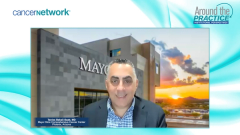
Colorectal Cancer Treatment Considerations Following IDEA Collaboration Analysis
A comprehensive discussion on treatment decision-making for patients with colorectal cancer following the IDEA collaboration analysis.
Episodes in this series

Transcript:
Tanios S. Bekaii-Saab, MD: Dan, you recently presented data from the experience of the practice with 3 vs 6 months. Talk a little more about this and how you integrate this in your clinic?
Daniel H. Ahn, DO: We presented data looking at the changes in prescribing patterns once the IDEA [international duration evaluation of adjuvant therapy] collaboration was published. To familiarize yourself with the IDEA collaboration, it looked to see whether 3 months of chemotherapy was noninferior to 6 months of chemotherapy in patients with stage III colon cancer. The IDEA collaboration showed that those with low-risk disease and, potentially, those with high-risk disease with certain caveats, like 3 months of chemotherapy—specifically capecitabine-oxaliplatin chemotherapy—would be noninferior to 6 months of chemotherapy.
In terms of how I’d integrate that with looking at stage II colon cancer, especially with the complicated nature of the data from the DYNAMIC trial, it’s a little more nuanced. The DYNAMIC trial looked at noninferiority to see whether patients could do as well as those without it. The challenges with the study was that the noninferiority margin was very large compared with the potential benefit from the addition of oxaliplatin chemotherapy. The risk is much higher for recurrence in those who have a positive ctDNA [circulating tumor DNA], and they’ll likely recur. When you look at the actual numbers of patients who recurred, the total number was much higher in those who were ctDNA negative. The incidence, or the percentage, was much higher than those who were positive, but we don’t necessarily spare all people from chemotherapy to getting curative intent if they’re ctDNA negative. Those are some of the challenges we have. A lot of the data that we have isn’t clear cut. Ultimately, a prospective trial randomizing patients with negative and positive to getting chemotherapy will hopefully answer some of these questions.
Tanios S. Bekaii-Saab, MD: Thanks, Dan. Joleen, let’s tweak this a little. Let’s say this was a stage IIIA patient—a low-risk, but still stage III, 1 lymph node positive, and MRD negative. That’s a patient with stage IIIA [disease], an MRD-negative patient, who’s age 55. They’re still a little reluctant about chemotherapy and want to have that discussion. Will MRD-negative gets swayed even further in their mind? They ask, “Doc, do I really need chemotherapy?” How do you think about that patient?
Joleen Hubbard, MD: That’s someone for whom I’d strongly consider 3 months of adjuvant therapy with capecitabine-oxaliplatin. Did you say that they were MRD negative?
Tanios S. Bekaii-Saab, MD: MRD negative, stage IIIA, 1 lymph node positive.
Joleen Hubbard, MD: At this point, I don’t have enough data. I don’t feel comfortable de-escalating and not giving treatment for a stage III for a couple of reasons. One, we might have a false negative. There are a lot of patients who eventually develop metastatic disease who were ctDNA negative a month after surgery. Two, if a patient converts from negative to positive, the prognosis is worse. If we delay chemotherapy until they’re MRD positive, are we missing a window of opportunity to get the most benefit out of adjuvant therapy? At this point, I’d still push the patient to get adjuvant therapy for low-risk stage III [disease], but I’d abbreviate it and do 3 months of capecitabine-oxaliplatin.
Aparna Parikh, MD, MS: Taking 1 step back, I agree. I’d encourage the patient to get 3 months of capecitabine-oxaliplatin. For a stage IIIA, MRD-negative patient, I’m not withholding therapy. I’d still recommend capecitabine-oxaliplatin. But in a patient who is adamantly against oxaliplatin, I might try to do 6 months of capecitabine or infusional 5-FU [5-fluorouracil] alone. I’m curious if anyone disagrees, but that’s how I’d approach it.
Tanios S. Bekaii-Saab, MD: Dan, how would you do it?
Daniel H. Ahn, DO: With the caveat that the data aren’t clear, but the benefit of oxaliplatin—even for those who complete all-oxaliplatin treatment—is very additive. Only a few percentage points of survival benefit. I’d probably proceed with 3 months of adjuvant capecitabine or any fluoropyrimidine monotherapy for 3 months.
Transcript edited for clarity.
Newsletter
Stay up to date on recent advances in the multidisciplinary approach to cancer.











































